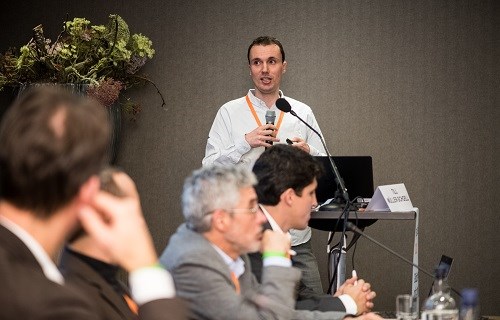European sports bodies need better outreach to society

Arnout Geeraert presents the preliminary results from the National Sports Governance Observer project. Photo: Thomas Søndergaard/Play the Game
26.11.2017
By Play the GameIn the light of the ongoing exposure on corruption and mismanagement of international sports federations, European sports organisations at the national level may draw a sigh of relief when looking at the first results of the ‘National Sports Governance Observer’ survey. A report was published today at the opening of the 10th Play the Game conference in Eindhoven, the Netherlands.
Experts from nine European nations have analysed the governance standards of at least eight federations in their respective home countries, and their preliminary conclusions do provide some encouragement:
On average, the national federations have transparent election rules for board members in place, seven out of ten use external auditors for their accounts, and eight out of ten publish their internal rules and regulations.
There is however much room for progress, the new report shows. Sports federations fail to report on board decisions and remuneration. Athlete involvement is mostly lacking and so are gender equity policies, and the majority of the federations are under-achieving on a number of societal tasks:
Though the scores vary per country, the large majority of the federations do not promote good governance in clubs. They fail to mitigate the health risks of sport, and they do not adequately combat sexual harassment and discrimination. They engage little in social projects and policies on gender equality and environmental sustainability.
“We hope our new benchmarking tool, the National Sports Governance Observer, will help national sports bodies improve their day-to-day business, so that they become more effective and socially responsible, and less vulnerable to abuse,” says the author of the report, Dr. Arnout Geeraert from KU Leuven.
So far, he and his colleagues have been positively surprised by the welcoming attitude of the federations they analysed.
“We found that most federations have shown a genuine interest in answering our questions and identifying weak points in their structures. Federations realise the importance of good governance but they often require a better understanding of what principles are relevant and how and why these principles should be implemented.”
The report is the first publication from the project ‘National Sports Governance Observer: Benchmarking sports governance across national boundaries’ project, which received a 383,000 euro grant from the Erasmus+ programme of the European Union.
Play the Game/Danish Institute for Sports Studies (Idan) acts as the coordinator of the project, which brings together academics and sports leaders from Belgium (Flanders), Cyprus, Denmark, Germany, the Netherlands, Norway, Poland and Romania.
Thanks to an earmarked grant from the Danish parliament, it has also been possible to include Montenegro and Brazil in the survey. For reasons of comparison, the Brazilian results are not part of the report, but they will be taken into account at a later stage and also communicated by the Brazilian partner organisation, “Sou do Esporte”.
The organisers hope it will be possible to include more countries in 2018, and several nations have expressed interest.
In all nine countries, the researchers have analysed the five federations of athletics, football, handball, swimming, and tennis. In each country, the experts have been free to choose three additional federations.
The final report, which will be published in 2018, will provide a detailed overview of the status quo of the governance of eight federations in each partner country and provide recommendations that aim to inform and stimulate federations’ governance policies. In addition to drafting the research reports, the research partners will also organise national training seminars for sports officials and policy makers.
Download the preliminary report
---------
The main aim of the NSGO project is to assist and inspire national sports organisations to raise the quality of their governance practices. More specifically, the project sets out to
- enable sports leaders and outside stakeholders to measure, discuss and amend the governance standards and practices of sports organisations by adapting and applying the NSGO indicators in national sports federations;
- establish sustainable networks between academics, practitioners and other key stakeholders with a common interest in good governance in sport at a national as well as international level through national training workshops and the Play the Game conference;
- educate and train sports leaders, researchers, and government representatives to understand, introduce, evaluate, and sustain good governance standards and practices in their respective organisations;
- provide government officials with knowledge and tools that enable them to engage in a dialogue with the sports movement with a view to inspiring better governance in sport and creating a robust framework for the allocation of public grants.
- produce, provide and disseminate national as well as comparative international and national data based on the NSGO indicators;
- initiate public debates on sports governance in order to raise the awareness of the topics and challenges related to good governance.
The project builds on the experience gained at a similar project targeting the 35 Olympic international federations, the Sports Governance Observer.
Nore information about the NSGO
Download the preliminary report:
NATIONAL SPORTS GOVERNANCE OBSERVER
Indicators of good governance in national federations. Preliminary report
Read more about the National Sports Governance Observer project





